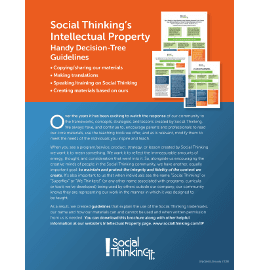Important Intellectual Property Information
Intellectual Property Decision-Tree Guidelines

Here’s a handy Decision-Tree formatted document that helps you find answers to most of our IP questions. It covers basics on using the Social Thinking name, products, and materials in your classroom or clinic, giving presentations, doing training on any part of the Social Thinking Methodology, posting Social Thinking materials and so much more! Please use it in conjunction with the Terms of Use document.
Last Updated: October 2024
Terms of Use, Definitions, Examples, & FAQ

Find detailed IP information in this document including expanded discussions and lots of examples on using our name and materials, modifying our materials for your use, creating new works based on Social Thinking, posting online (YouTube, TeachersPayTeachers, etc.), giving presentations or trainings, providing attribution, and more! Please use it in conjunction with the Decision-Tree document.
Updated: November 2024
Translation Policy for Social Thinking Materials

Here you will be able to access our updated Translation Policy. Find the answers to many of your questions related to translation of large portions of our books, publishing in other countries or languages, translating our free articles, as well as translating materials used directly with students. In addition, we offer suggestions on how you can assist!
Last Updated: November 2024